Report on the Core Principles of Criminal Law & Criminalisation
VerifiedAdded on 2023/06/10
|6
|1329
|96
Report
AI Summary
This report provides an overview of the principles of criminal law, focusing on the concept of criminalisation. It defines crime as an illegal act punishable under criminal law and discusses the principles of criminalisation, including legality, mens rea, actus rea, harm, cause, and punishment. The report emphasizes that an accused is not considered a criminal until proven guilty in court and highlights the importance of evidence in establishing guilt. It also suggests modifications to the criminalisation process, such as speedy trials and more severe punishments for serious offenses, and concludes by underscoring the need for government action to improve the criminal justice system. Desklib offers this assignment solution and many more resources for students.
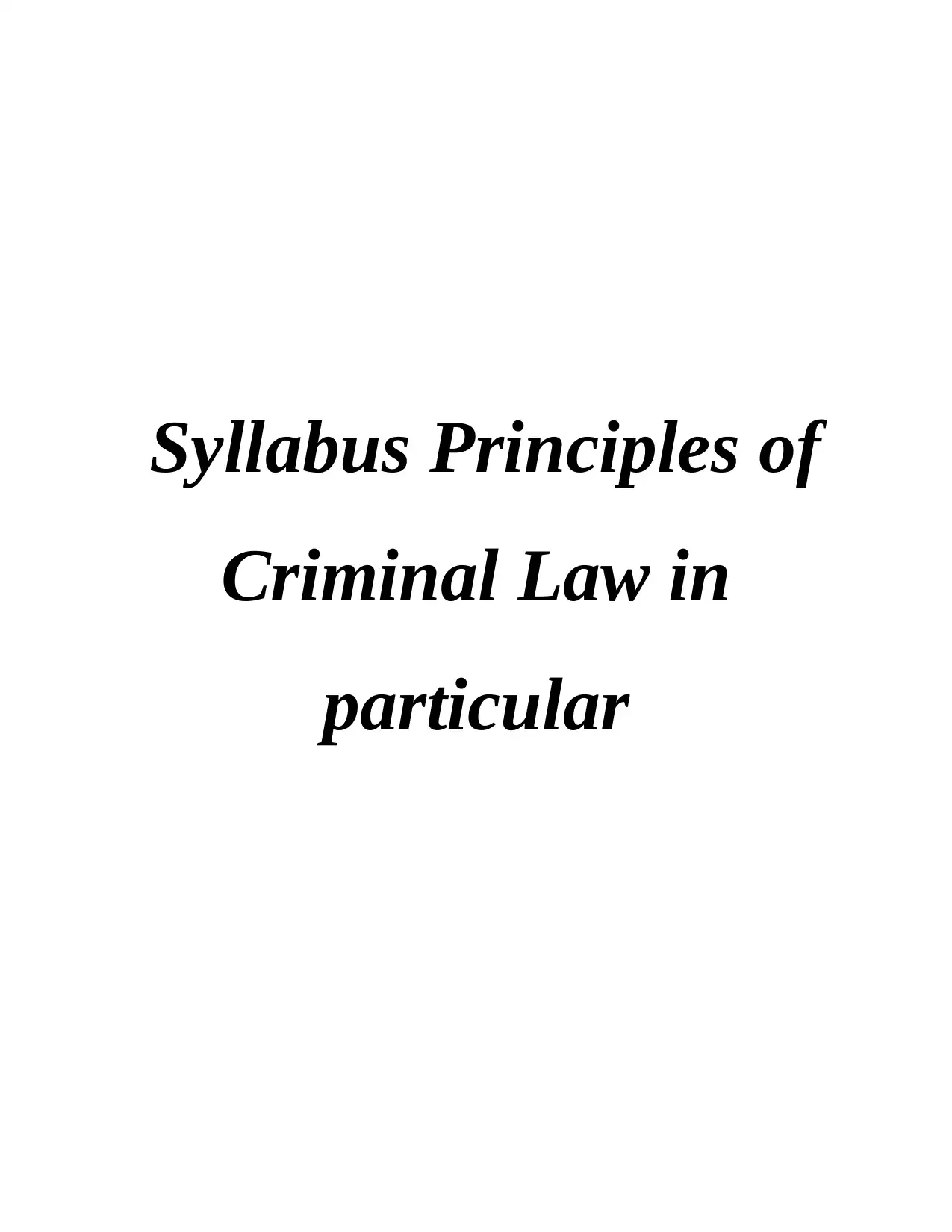
Syllabus Principles of
Criminal Law in
particular
Criminal Law in
particular
Paraphrase This Document
Need a fresh take? Get an instant paraphrase of this document with our AI Paraphraser

Table of Contents
INTRODUCTION...........................................................................................................................1
MAIN BODY...................................................................................................................................1
CONCLUSION................................................................................................................................3
REFERENCES:...............................................................................................................................4
INTRODUCTION...........................................................................................................................1
MAIN BODY...................................................................................................................................1
CONCLUSION................................................................................................................................3
REFERENCES:...............................................................................................................................4
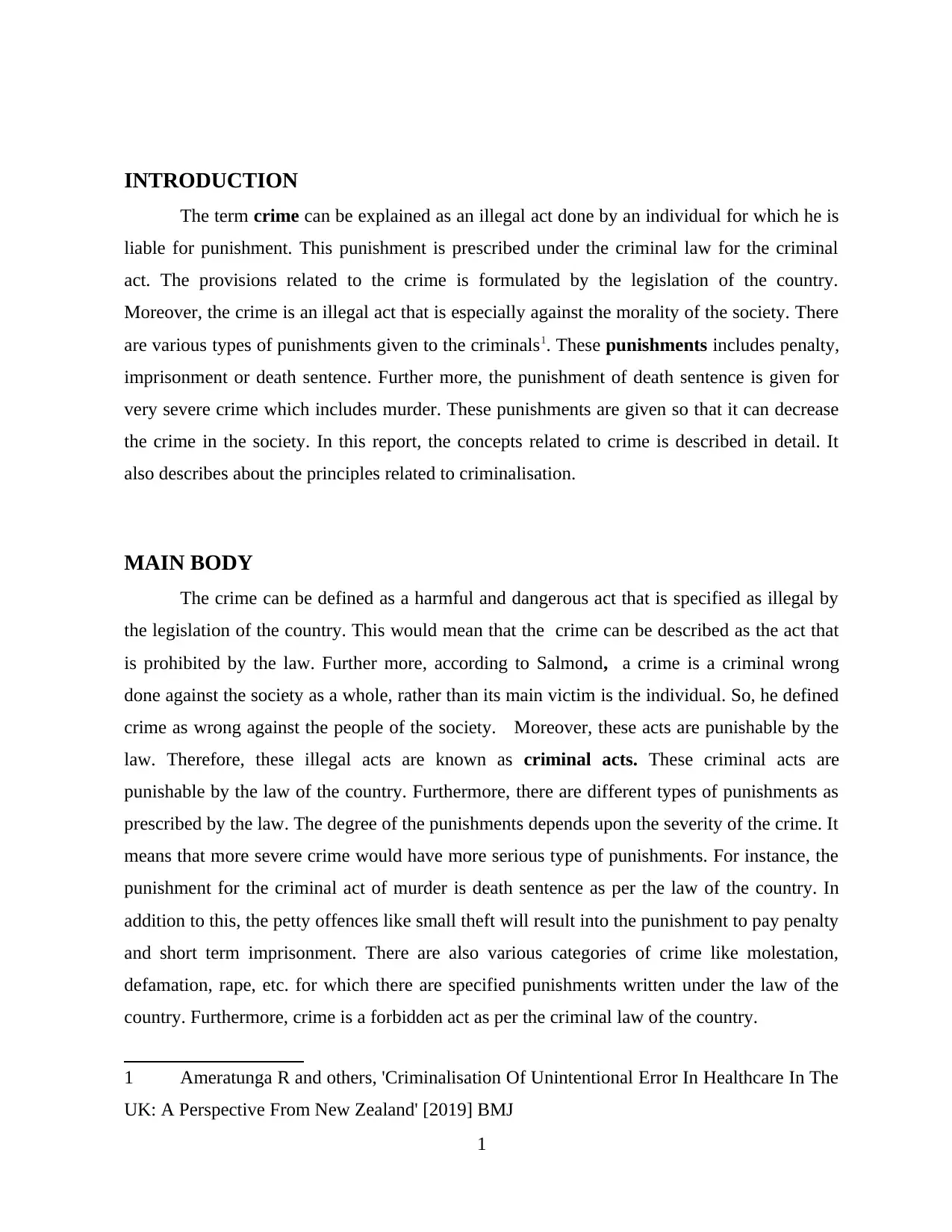
INTRODUCTION
The term crime can be explained as an illegal act done by an individual for which he is
liable for punishment. This punishment is prescribed under the criminal law for the criminal
act. The provisions related to the crime is formulated by the legislation of the country.
Moreover, the crime is an illegal act that is especially against the morality of the society. There
are various types of punishments given to the criminals1. These punishments includes penalty,
imprisonment or death sentence. Further more, the punishment of death sentence is given for
very severe crime which includes murder. These punishments are given so that it can decrease
the crime in the society. In this report, the concepts related to crime is described in detail. It
also describes about the principles related to criminalisation.
MAIN BODY
The crime can be defined as a harmful and dangerous act that is specified as illegal by
the legislation of the country. This would mean that the crime can be described as the act that
is prohibited by the law. Further more, according to Salmond, a crime is a criminal wrong
done against the society as a whole, rather than its main victim is the individual. So, he defined
crime as wrong against the people of the society. Moreover, these acts are punishable by the
law. Therefore, these illegal acts are known as criminal acts. These criminal acts are
punishable by the law of the country. Furthermore, there are different types of punishments as
prescribed by the law. The degree of the punishments depends upon the severity of the crime. It
means that more severe crime would have more serious type of punishments. For instance, the
punishment for the criminal act of murder is death sentence as per the law of the country. In
addition to this, the petty offences like small theft will result into the punishment to pay penalty
and short term imprisonment. There are also various categories of crime like molestation,
defamation, rape, etc. for which there are specified punishments written under the law of the
country. Furthermore, crime is a forbidden act as per the criminal law of the country.
1 Ameratunga R and others, 'Criminalisation Of Unintentional Error In Healthcare In The
UK: A Perspective From New Zealand' [2019] BMJ
1
The term crime can be explained as an illegal act done by an individual for which he is
liable for punishment. This punishment is prescribed under the criminal law for the criminal
act. The provisions related to the crime is formulated by the legislation of the country.
Moreover, the crime is an illegal act that is especially against the morality of the society. There
are various types of punishments given to the criminals1. These punishments includes penalty,
imprisonment or death sentence. Further more, the punishment of death sentence is given for
very severe crime which includes murder. These punishments are given so that it can decrease
the crime in the society. In this report, the concepts related to crime is described in detail. It
also describes about the principles related to criminalisation.
MAIN BODY
The crime can be defined as a harmful and dangerous act that is specified as illegal by
the legislation of the country. This would mean that the crime can be described as the act that
is prohibited by the law. Further more, according to Salmond, a crime is a criminal wrong
done against the society as a whole, rather than its main victim is the individual. So, he defined
crime as wrong against the people of the society. Moreover, these acts are punishable by the
law. Therefore, these illegal acts are known as criminal acts. These criminal acts are
punishable by the law of the country. Furthermore, there are different types of punishments as
prescribed by the law. The degree of the punishments depends upon the severity of the crime. It
means that more severe crime would have more serious type of punishments. For instance, the
punishment for the criminal act of murder is death sentence as per the law of the country. In
addition to this, the petty offences like small theft will result into the punishment to pay penalty
and short term imprisonment. There are also various categories of crime like molestation,
defamation, rape, etc. for which there are specified punishments written under the law of the
country. Furthermore, crime is a forbidden act as per the criminal law of the country.
1 Ameratunga R and others, 'Criminalisation Of Unintentional Error In Healthcare In The
UK: A Perspective From New Zealand' [2019] BMJ
1
⊘ This is a preview!⊘
Do you want full access?
Subscribe today to unlock all pages.

Trusted by 1+ million students worldwide
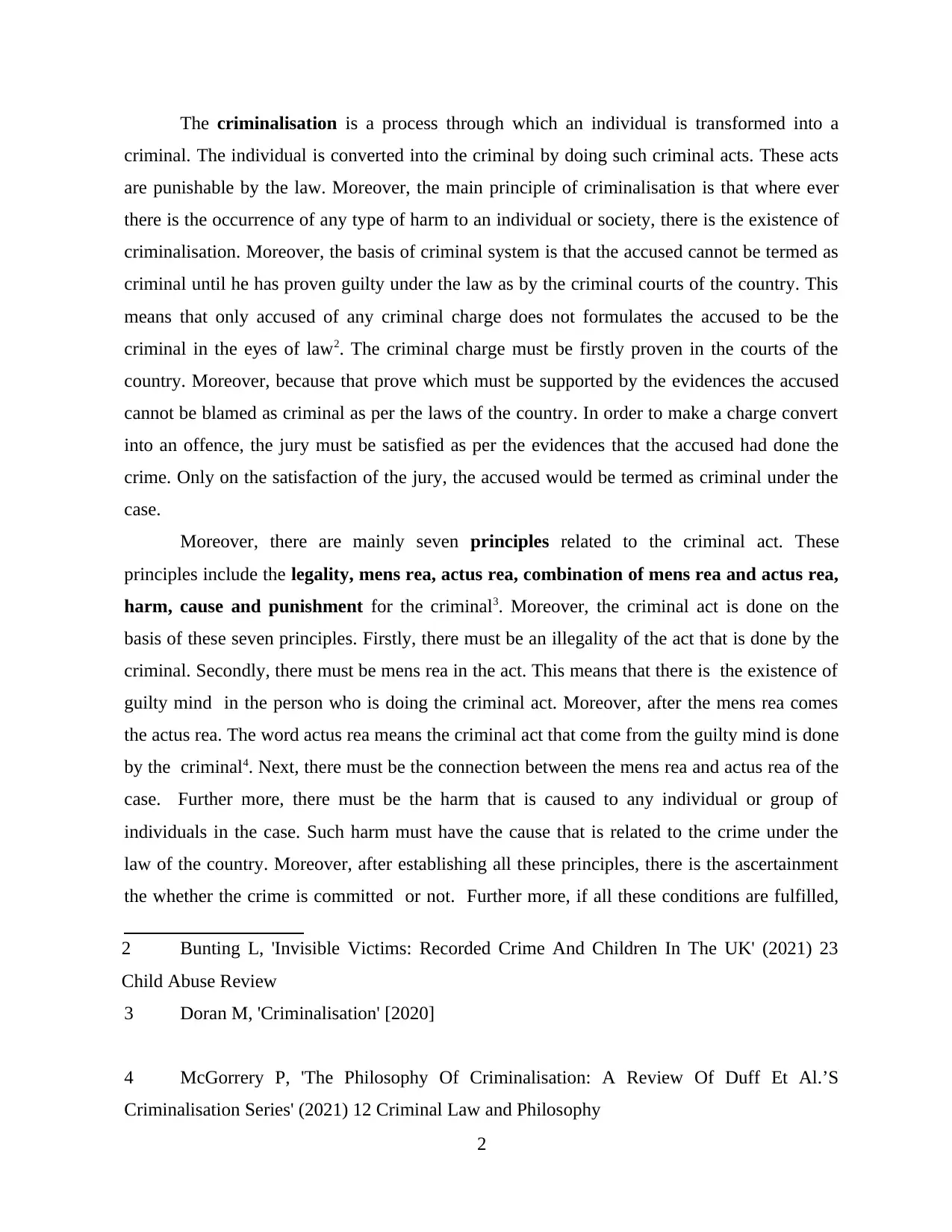
The criminalisation is a process through which an individual is transformed into a
criminal. The individual is converted into the criminal by doing such criminal acts. These acts
are punishable by the law. Moreover, the main principle of criminalisation is that where ever
there is the occurrence of any type of harm to an individual or society, there is the existence of
criminalisation. Moreover, the basis of criminal system is that the accused cannot be termed as
criminal until he has proven guilty under the law as by the criminal courts of the country. This
means that only accused of any criminal charge does not formulates the accused to be the
criminal in the eyes of law2. The criminal charge must be firstly proven in the courts of the
country. Moreover, because that prove which must be supported by the evidences the accused
cannot be blamed as criminal as per the laws of the country. In order to make a charge convert
into an offence, the jury must be satisfied as per the evidences that the accused had done the
crime. Only on the satisfaction of the jury, the accused would be termed as criminal under the
case.
Moreover, there are mainly seven principles related to the criminal act. These
principles include the legality, mens rea, actus rea, combination of mens rea and actus rea,
harm, cause and punishment for the criminal3. Moreover, the criminal act is done on the
basis of these seven principles. Firstly, there must be an illegality of the act that is done by the
criminal. Secondly, there must be mens rea in the act. This means that there is the existence of
guilty mind in the person who is doing the criminal act. Moreover, after the mens rea comes
the actus rea. The word actus rea means the criminal act that come from the guilty mind is done
by the criminal4. Next, there must be the connection between the mens rea and actus rea of the
case. Further more, there must be the harm that is caused to any individual or group of
individuals in the case. Such harm must have the cause that is related to the crime under the
law of the country. Moreover, after establishing all these principles, there is the ascertainment
the whether the crime is committed or not. Further more, if all these conditions are fulfilled,
2 Bunting L, 'Invisible Victims: Recorded Crime And Children In The UK' (2021) 23
Child Abuse Review
3 Doran M, 'Criminalisation' [2020]
4 McGorrery P, 'The Philosophy Of Criminalisation: A Review Of Duff Et Al.’S
Criminalisation Series' (2021) 12 Criminal Law and Philosophy
2
criminal. The individual is converted into the criminal by doing such criminal acts. These acts
are punishable by the law. Moreover, the main principle of criminalisation is that where ever
there is the occurrence of any type of harm to an individual or society, there is the existence of
criminalisation. Moreover, the basis of criminal system is that the accused cannot be termed as
criminal until he has proven guilty under the law as by the criminal courts of the country. This
means that only accused of any criminal charge does not formulates the accused to be the
criminal in the eyes of law2. The criminal charge must be firstly proven in the courts of the
country. Moreover, because that prove which must be supported by the evidences the accused
cannot be blamed as criminal as per the laws of the country. In order to make a charge convert
into an offence, the jury must be satisfied as per the evidences that the accused had done the
crime. Only on the satisfaction of the jury, the accused would be termed as criminal under the
case.
Moreover, there are mainly seven principles related to the criminal act. These
principles include the legality, mens rea, actus rea, combination of mens rea and actus rea,
harm, cause and punishment for the criminal3. Moreover, the criminal act is done on the
basis of these seven principles. Firstly, there must be an illegality of the act that is done by the
criminal. Secondly, there must be mens rea in the act. This means that there is the existence of
guilty mind in the person who is doing the criminal act. Moreover, after the mens rea comes
the actus rea. The word actus rea means the criminal act that come from the guilty mind is done
by the criminal4. Next, there must be the connection between the mens rea and actus rea of the
case. Further more, there must be the harm that is caused to any individual or group of
individuals in the case. Such harm must have the cause that is related to the crime under the
law of the country. Moreover, after establishing all these principles, there is the ascertainment
the whether the crime is committed or not. Further more, if all these conditions are fulfilled,
2 Bunting L, 'Invisible Victims: Recorded Crime And Children In The UK' (2021) 23
Child Abuse Review
3 Doran M, 'Criminalisation' [2020]
4 McGorrery P, 'The Philosophy Of Criminalisation: A Review Of Duff Et Al.’S
Criminalisation Series' (2021) 12 Criminal Law and Philosophy
2
Paraphrase This Document
Need a fresh take? Get an instant paraphrase of this document with our AI Paraphraser
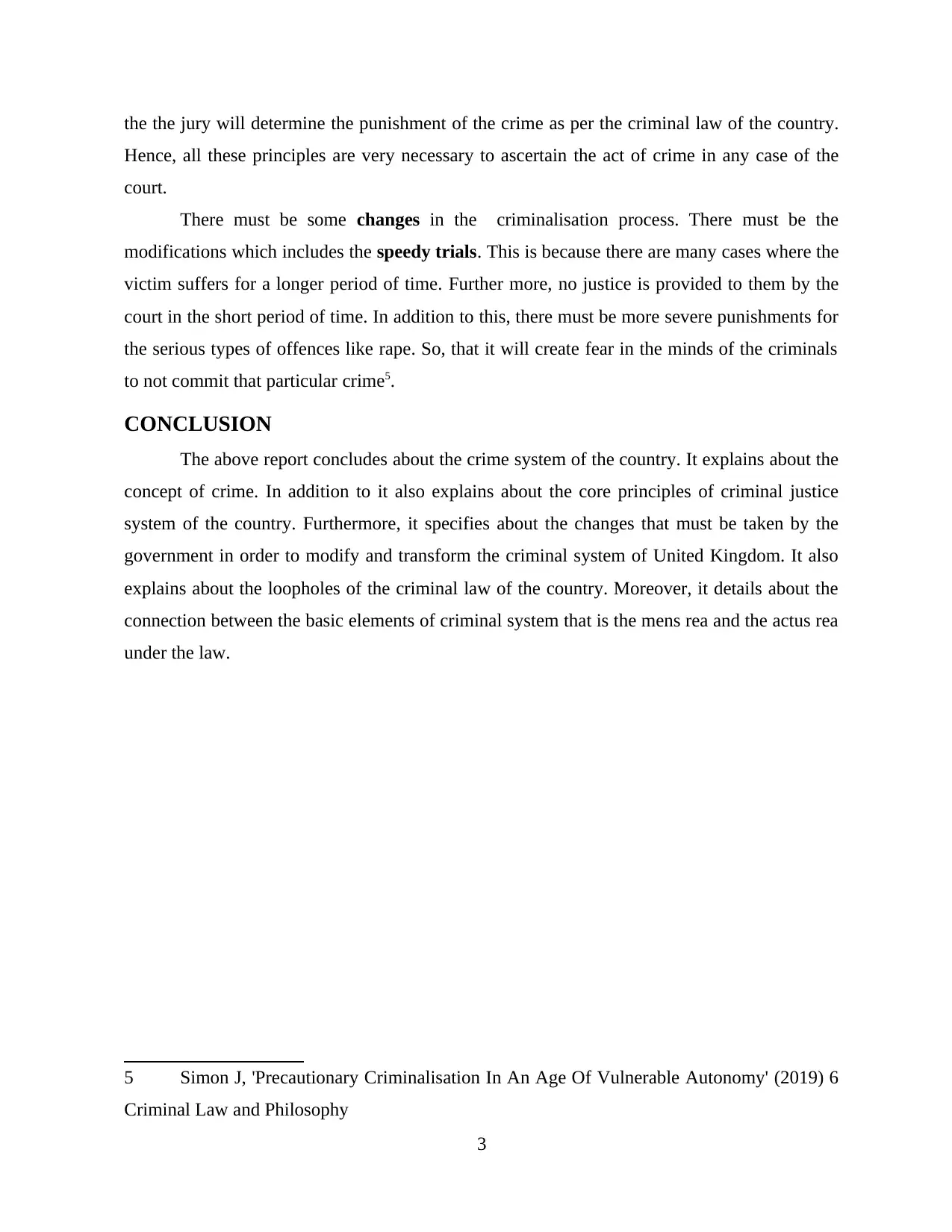
the the jury will determine the punishment of the crime as per the criminal law of the country.
Hence, all these principles are very necessary to ascertain the act of crime in any case of the
court.
There must be some changes in the criminalisation process. There must be the
modifications which includes the speedy trials. This is because there are many cases where the
victim suffers for a longer period of time. Further more, no justice is provided to them by the
court in the short period of time. In addition to this, there must be more severe punishments for
the serious types of offences like rape. So, that it will create fear in the minds of the criminals
to not commit that particular crime5.
CONCLUSION
The above report concludes about the crime system of the country. It explains about the
concept of crime. In addition to it also explains about the core principles of criminal justice
system of the country. Furthermore, it specifies about the changes that must be taken by the
government in order to modify and transform the criminal system of United Kingdom. It also
explains about the loopholes of the criminal law of the country. Moreover, it details about the
connection between the basic elements of criminal system that is the mens rea and the actus rea
under the law.
5 Simon J, 'Precautionary Criminalisation In An Age Of Vulnerable Autonomy' (2019) 6
Criminal Law and Philosophy
3
Hence, all these principles are very necessary to ascertain the act of crime in any case of the
court.
There must be some changes in the criminalisation process. There must be the
modifications which includes the speedy trials. This is because there are many cases where the
victim suffers for a longer period of time. Further more, no justice is provided to them by the
court in the short period of time. In addition to this, there must be more severe punishments for
the serious types of offences like rape. So, that it will create fear in the minds of the criminals
to not commit that particular crime5.
CONCLUSION
The above report concludes about the crime system of the country. It explains about the
concept of crime. In addition to it also explains about the core principles of criminal justice
system of the country. Furthermore, it specifies about the changes that must be taken by the
government in order to modify and transform the criminal system of United Kingdom. It also
explains about the loopholes of the criminal law of the country. Moreover, it details about the
connection between the basic elements of criminal system that is the mens rea and the actus rea
under the law.
5 Simon J, 'Precautionary Criminalisation In An Age Of Vulnerable Autonomy' (2019) 6
Criminal Law and Philosophy
3
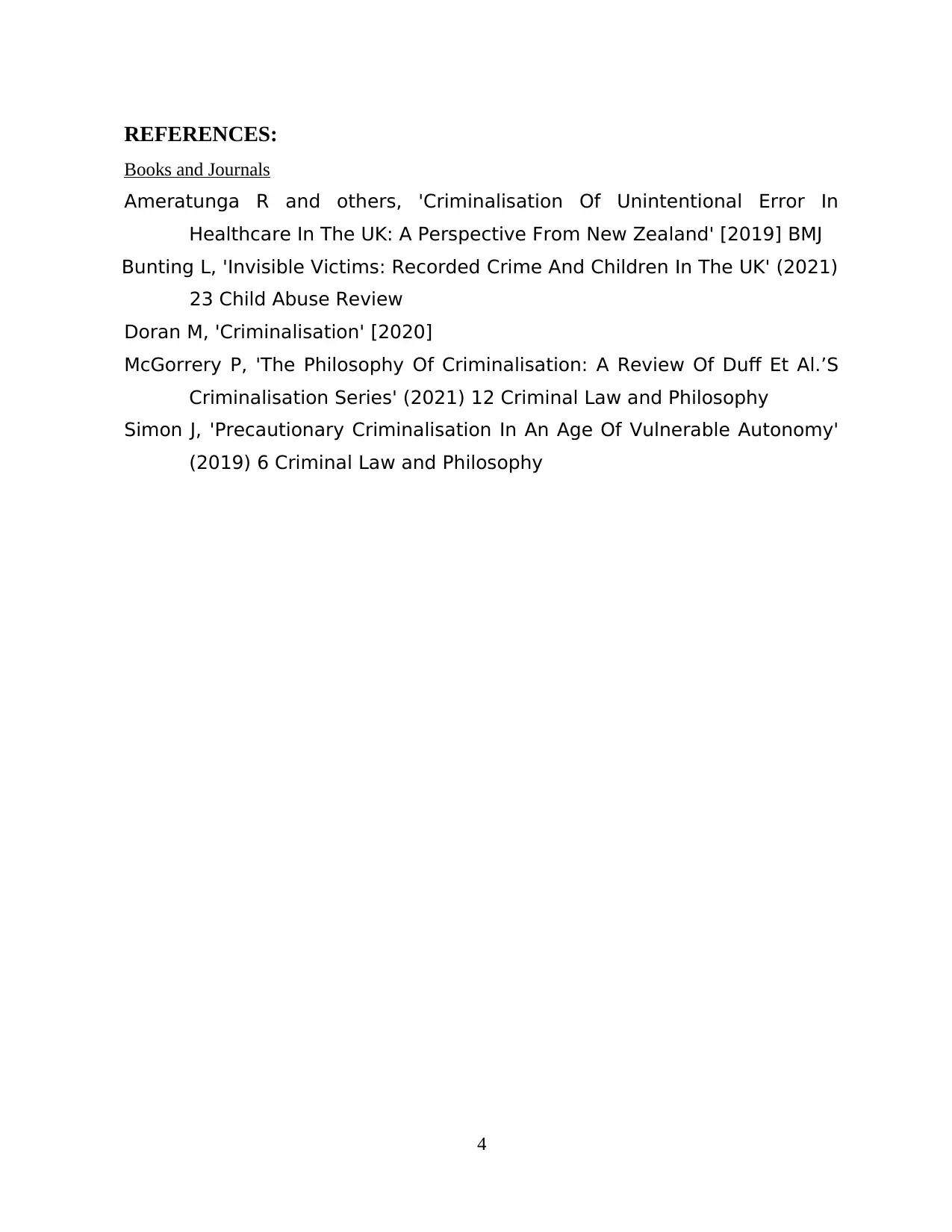
REFERENCES:
Books and Journals
Ameratunga R and others, 'Criminalisation Of Unintentional Error In
Healthcare In The UK: A Perspective From New Zealand' [2019] BMJ
Bunting L, 'Invisible Victims: Recorded Crime And Children In The UK' (2021)
23 Child Abuse Review
Doran M, 'Criminalisation' [2020]
McGorrery P, 'The Philosophy Of Criminalisation: A Review Of Duff Et Al.’S
Criminalisation Series' (2021) 12 Criminal Law and Philosophy
Simon J, 'Precautionary Criminalisation In An Age Of Vulnerable Autonomy'
(2019) 6 Criminal Law and Philosophy
4
Books and Journals
Ameratunga R and others, 'Criminalisation Of Unintentional Error In
Healthcare In The UK: A Perspective From New Zealand' [2019] BMJ
Bunting L, 'Invisible Victims: Recorded Crime And Children In The UK' (2021)
23 Child Abuse Review
Doran M, 'Criminalisation' [2020]
McGorrery P, 'The Philosophy Of Criminalisation: A Review Of Duff Et Al.’S
Criminalisation Series' (2021) 12 Criminal Law and Philosophy
Simon J, 'Precautionary Criminalisation In An Age Of Vulnerable Autonomy'
(2019) 6 Criminal Law and Philosophy
4
⊘ This is a preview!⊘
Do you want full access?
Subscribe today to unlock all pages.

Trusted by 1+ million students worldwide
1 out of 6
Related Documents
Your All-in-One AI-Powered Toolkit for Academic Success.
+13062052269
info@desklib.com
Available 24*7 on WhatsApp / Email
![[object Object]](/_next/static/media/star-bottom.7253800d.svg)
Unlock your academic potential
Copyright © 2020–2026 A2Z Services. All Rights Reserved. Developed and managed by ZUCOL.



